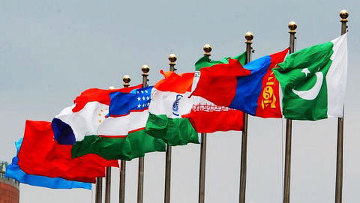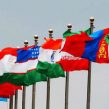
Shanghai Cooperation Organization Considers Expansion
Publication: Eurasia Daily Monitor Volume: 8 Issue: 216
By:

The heads of government of the Shanghai Cooperation Organization (SCO) have reiterated earlier promises to enlarge the grouping. Thus, the organization (currently including Russia, China, Kazakhstan, Kyrgyzstan, Tajikistan and Uzbekistan) has insisted on its global ambitions. SCO expansion would serve to strengthen its international status, Prime Minister Vladimir Putin announced on November 7. He also urged member states to draft and adopt a blueprint aimed to develop multilateral trade and economic ties. The SCO should become a “basic structure of the global economic and political architecture,” Putin said (Interfax, ITAR-TASS, RIA Novosti, November 7).
The SCO key member states voiced interest in strengthening the grouping by inviting South Asia’s major nations. On October 31, Russia and China voiced support for the speedy SCO accession of India and Pakistan. The announcement was made following talks in Moscow between Russian Deputy Foreign Minister, Aleksandr Borodavkin, and his Chinese counterpart Cheng Guoping. Both sides supported the SCO membership of India and Pakistan, observer status of Pakistan and dialogue partner status of Turkey, the Russian foreign ministry said in a statement after the talks (Interfax, October 31).
The SCO has already prepared itself for accepting new member countries. The previous SCO summit in Tashkent in June 2010 approved the rules on accepting new member-states. According to these rules, the SCO’s new members must be Eurasian nations, have diplomatic relations with all current member states, and have either observer or dialogue partner status.
However, the rules stipulate that would-be member countries must not be subject to UN sanctions, or be involved in any armed conflict. These conditions effectively rule out membership for Iran, India and Pakistan. Last June, Russian officials made it clear the SCO would not accept India and Pakistan as full members due to the continued territorial dispute between them. But in November, Moscow appeared to change its earlier position by indicating interest in the SCO membership of India and Pakistan.
Furthermore, Russian media outlets speculated that the grouping may also be interested in Iranian membership. On November 7, Izvestiya claimed that the SCO was inviting Iran, among other observer nations, to join the grouping. However, the daily conceded that the meeting in St. Petersburg refrained from specific discussions of Iran’s possible accession (Izvestiya, November 7).
In the past several years, the SCO has expanded its partnership program. Iran, as well as India, Mongolia and Pakistan, are currently SCO partners, while Belarus and Sri Lanka are dialogue partners. The Kremlin also used the SCO meeting as an opportunity to voice its concerns on international issues. Ahead of the meeting, Kirill Barsky, the Russian presidential envoy in the SCO, said the grouping opposed “unilateral” missile defense efforts. However, in remarks on November 1, Barsky conceded that the SCO was not a military bloc and the organization was not directed against any nation (Interfax, November 1).
The SCO has long been seen as aiming to unite Central Eurasian nations in their opposition to perceived US global domination. The June 2011 SCO summit voiced opposition against what was described as “unilateral” moves in missile defense as detrimental to international security. However, the SCO member states apparently continued to avoid any anti-Western verbal attacks.
The meeting in St. Petersburg also focused on economic matters. It adopted a joint statement and a mid-term blueprint to develop multilateral banking cooperation in 2012-2016, as well as approved plans to create a multilateral development bank. The SCO prime ministers agreed to hold their next meeting in Kyrgyzstan (Interfax, ITAR-TASS, RIA Novosti, November 7).
At a separate meeting with his Chinese counterpart, Wen Jiabao, Putin hailed bilateral economic and trade ties, adding that commerce between the two nations would reach $80 billion this year. Wen Jiabao also discussed bilateral economic ties with his Kazakh counterpart Karim Masimov.
Masimov told the meeting that the SCO should consider the creation of a new financial body, a joint multilateral reserve bank. He argued the new bank would help member states to minimize adverse repercussions of the upcoming second wave of the global financial crisis (RIA Novosti, November 7). Chinese Prime Minister Wen Jiabao told the meeting that Beijing was prepared to grant concessionary loans to finance infrastructure development programs of the SCO member states.
After the meeting, Moscow suggested that transport infrastructure projects should be prioritized. On November 8, Putin announced that the SCO meeting agreed to work out new incentives to develop international road networks and transportation. The SCO should also prioritize cross-border transportation corridors to connect Europe and Asia-Pacific, he said (Interfax, ITAR-TASS, RIA Novosti, November 7).
In the past, the SCO member states advocated increased trade, the introduction of the new international currency and the regional unified energy system. During the SCO summit meeting in Astana on June 15, Kazakhstan’s President Nursultan Nazarbayev urged the SCO to create the new international currency based on the gold standard. Therefore, the latest SCO top-level meeting came to indicate the grouping’s global political and economic ambitions. However, it remains to be seen whether the organization could manage to expand its global clout.




